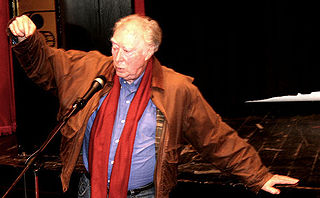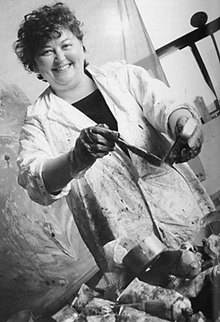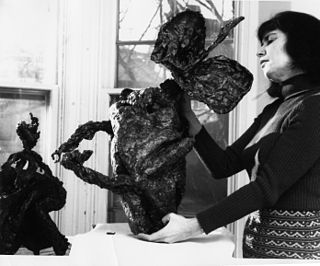Related Research Articles

John Christopher Pratt was among Canada's most prominent painters and printmakers. In addition to a body of highly acclaimed paintings, prints, drawings and writing, he designed the flag of Newfoundland and Labrador.

Michael James Aleck Snow was a Canadian artist who worked in a range of media including film, installation, sculpture, photography, and music. His best-known films are Wavelength (1967) and La Région Centrale (1971), with the former regarded as a milestone in avant-garde cinema.

Richard William Hamilton CH was an English painter and collage artist. His 1955 exhibition Man, Machine and Motion and his 1956 collage Just what is it that makes today's homes so different, so appealing?, produced for the This Is Tomorrow exhibition of the Independent Group in London, are considered by critics and historians to be among the earliest works of pop art. A major retrospective of his work was at Tate Modern in 2014.
Avrom Isaacs, D.F.A. was a Canadian art dealer.

General Idea was a collective of three Canadian artists, Felix Partz, Jorge Zontal and AA Bronson, who were active from 1967 to 1994. As pioneers of early conceptual and media-based art, their collaboration became a model for artist-initiated activities and continues to be a prominent influence on subsequent generations of artists.

Joyce Wieland was a Canadian experimental filmmaker and mixed media artist. Wieland found success as a painter when she began her career in Toronto in the 1950s. In 1962, Wieland moved to New York City and expanded her career as an artist by including new materials and mixed media work. During that time, she also rose to prominence as an experimental filmmaker and soon, institutions such as the Museum of Modern Art in New York were showing her films. In 1971, Wieland's True Patriot Love exhibition was the first solo exhibition by a living Canadian female artist at the National Gallery of Canada. In 1982, Wieland received the honour of an Officer of the Order of Canada and in 1987, she was awarded the Toronto Arts Foundation's Visual Arts Award. She was also a member of the Royal Canadian Academy of Arts.
Sam Borenstein was a Canadian painter. During his forty-year career he painted numerous scenes of Montreal and Laurentian villages and Quebec landscapes bustling with human activity, using brilliant colours and exuberant brushwork. Borenstein was best known for his expressionistic cityscapes and rural scenes, but also produced numerous portraits and still lifes.
New Film Makers is a Canadian experimental short film television miniseries which was broadcast on CBC Television in 1969.

Sarah Jeanette Jackson, was an American-Canadian artist. Jackson first became known for her sculptures and drawings, and then for her photocopy and digital art. She was an early user of the photocopier to make art, and used this practice to embrace mail art.
Constance "Colette" Joyce Urban was a Canadian/American artist known for performance art, sculpture and installation. Her work questioned social conventions, gender roles, and the relationship between spectator and performer, as well as consumer culture and the everyday with a disarming and humorous tone. Urban was a tenured Professor of Visual Arts at University of Western Ontario in London, Ontario, Canada, until 2006, when she relocated to the Bay of Islands, in Western Newfoundland and based herself in the communities of Meadows and McIvers, Newfoundland, to develop Full Tilt Creative Centre, an artist residency, organic farm and exhibition venue. In November 2012, after a lengthy period of mysterious pain, Urban was diagnosed with Stage 4 Cancer. She died at her home in McIvers in 2013.
The Far Shore is a Canadian drama film, directed by Joyce Wieland and released in 1976. Wieland's first commercial narrative feature film after years of making experimental short films, The Far Shore is a romantic drama which borrows elements from the life and death of painter Tom Thomson.
Jan Allen is a Canadian curator, writer, visual artist, and assistant professor in the Department of Art History and Art Conservation, and the Cultural Studies Program, at Queen's University, in Kingston, Ontario.
Gordon Rayner was a Canadian abstract expressionist painter. His way of creating art was idiosyncratic and characterized by constant innovation and often by transformation of his medium. Later, he integrated realism into his practice.
Dennis Burton was a Canadian modernist painter.
Michel Lambeth was a Canadian photographer. He made an in-depth photographic study of Toronto during the 1950s and was one of the country's leading photo-journalists during the 1960s.
Robert Markle was a Canadian painter of the female nude.
Pierre Théberge was a museum director, curator and art historian, who was an advocate for Canadian art.
Artist on Fire is a Canadian documentary film, directed by Kay Armatage and released in 1987. The film is a portrait of Canadian feminist artist and filmmaker Joyce Wieland.
Su Rynard is a Canadian film and television director, editor and video artist. She is most noted as the director of the 2005 feature film Kardia, which was the winner of the Alfred P. Sloan Foundation Feature Film Prize at the 2005 Hamptons International Film Festival.
Reason Over Passion is a Canadian experimental film, directed by Joyce Wieland and released in 1969. A reflection on Pierre Trudeau's famous public statement that he valued reason over passion in his approach to governing Canada, the film deconstructs the concept by blending news footage of Trudeau at the 1968 Liberal Party of Canada leadership election with tracking shots of the Canadian landscape, as the letters in the subtitle "reason over passion" rearrange and scramble into 537 nonsensical anagrams over the course of the film.
References
- ↑ "Rat Life and Diet in North America". Canadian Film Encyclopedia.
- ↑ "Joyce thinks Canada, is last hope for rats and people". The Globe and Mail , March 8, 1969.
- ↑ Holmes-Moss, Kristy A. 2006. "Negotiating the Nation: "Expanding" the Work of Joyce Wieland. Canadian Journal of Film Studies XV (2): 20.
- ↑ "Canada world's last hope 'for a Utopia'". Ottawa Citizen , March 10, 1969.
- ↑ Manny Farber, "Films at Canadian Artists 68"]. Artscanada, Vol. 26, No. 1 (February 1969). pp. 28-29.
- ↑ "Rat Life Featured On Canadian Film". Calgary Herald , May 23, 1969.
- ↑ John Bentley Mays, "AGO retrospective enshrines the myth Surrounding Wieland"]. The Globe and Mail , April 18, 1987.
- ↑ "What Is Canadian Film?" The Globe and Mail , February 10, 1996.